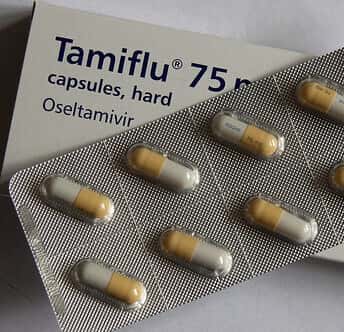
The flu season this year started early all around the world. What we are dealing with is the Subclade K influenza—a H3N2 variant with seven new mutations. You can read all about this evolving influenza virus at this link. The CDC has let us down this year. For one thing, this critical organization is now short-staffed. For another, the government shutdown made gathering data challenging at best. So, we have been pretty much flying blind. The most recent CDC Fluview for week 47, ending November 22, 2025 reports that the the “trend” is up! It is unclear how well the flu vaccines will work this year because of the genetic drift. You can still find out about protecting yourself from the flu. One reader shared a recommendation.
Protecting Yourself from the Flu with Medication:
Q. If you know you have been exposed to influenza, start taking an antiviral drug immediately. If you begin the drug as soon as you are exposed, you will significantly lower your chances of getting sick.
I was in a situation where four people (three adults and an infant) were exposed to a confirmed case of influenza. We all got prescriptions for Tamiflu, and three of us started taking it immediately. One adult decided to skip the Tamiflu. The people who took it never had any symptoms at all. The one who did not came down with a miserable case of influenza and took a month to recover from it.
A. Not everyone realizes that an antiviral drug used to treat the flu can also be used for protecting yourself from the flu. Doctors prescribe oseltamivir (Tamiflu), baloxavir (Xofluza) or zanamivir (Relenza) to help prevent influenza (Cochrane Database of Systematic Reviews, April 10, 2014). If you do come down with influenza, you could take one of these drugs to shorten the illness.
Protecting Yourself From the Flu Doesn’t Work for Everyone:
Q. I was hospitalized for five days with the flu two years ago. They put me on Tamiflu. I also continued it at home.
The drug did nothing but make my symptoms worse, especially diarrhea. I would not take Tamiflu again because of the side effects.
A. Oseltamivir (Tamiflu) can cause digestive distress, but not everyone has had such a negative experience. Another reader reported:
“I had the flu several years ago, and the doctor prescribed Tamiflu on the second day. There were 5 pills, and it cost $100.
“I took 1 pill a day and felt so good by the third day that I stopped taking them. What a wonderful drug!”
We are always impressed when people report dramatically different reactions to medications. Some people report that Tamiflu is great. Others say it is worthless or intolerable. It is hard to predict who will benefit and who will be harmed.
Oseltamivir is not the only antiviral that can prevent influenza or shorten the duration of the flu. All of the antivirals work best when taken as early as possible in the course of the infection. You can learn more about such drugs in our eGuide to Colds, Coughs & the Flu. This online resource is available under the Health eGuide tab. It also discusses non-drug approaches that may help ease symptoms.
The CDC states:
“Antiviral medications are an important adjunct to flu vaccine in the control of influenza. Almost all (>99%) of the influenza viruses tested this season are susceptible to the four FDA-approved influenza antiviral medications recommended for use in the U.S. this season.”
You benefit most from drugs like oseltamivir, zanamivir or baloxavir by taking them within 24 to 48 hours of exposure. Oseltamivir can cause nausea and vomiting, so you should eat something when you take it. Xofluza should not be taken with dairy products or vitamins containing minerals such as calcium, iron, zinc or magnesium. If nausea persists, please consult your doctor.
Citations
- Jefferson T et al, "Neuraminidase inhibitors for preventing and treating influenza in healthy adults and children." Cochrane Database of Systematic Reviews, April 10, 2014. DOI: 10.1002/14651858.CD008965.pub4

